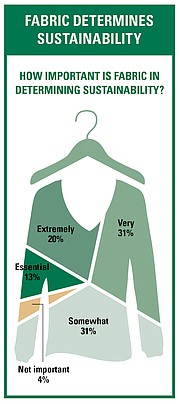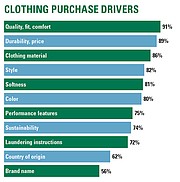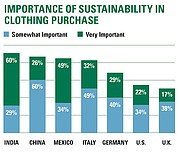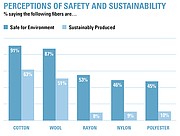MANUFACTURING
Survey Finds Sustainability Affects Clothing Purchases
The results of a survey of 7,300 men and women in various countries revealed that more shoppers are taking into account the role clothing brands are playing in sustaining the environment and preventing climate change.
Cotton Inc. and Cotton Council International polled consumers between the ages of 18 and 60 in the United States, Great Britain, Mexico, India, Italy and China in 2017 to get their opinion on whether sustainability was really important to them or just something they thought about but didn’t act upon.
The results of the recent “Global Environmental Research Study” showed many consumers felt that things need to be done differently when it comes to manufacturing clothing.
That is driven home by the Environmental Protection Agency’s 2015 estimate that more than 16 million tons of textiles are discarded every year, with 66 percent ending up in landfills. About 60 percent of apparel textiles are made of synthetics, including polyester, nylon and acrylic, which are not biodegradable.
Sustainability is something that influences more than three-quarters of consumers when they shop for food and household appliances and 61 percent when they purchase clothing.
While quality, fit and comfort are still at the top of the list when buying clothing, sustainability can set a brand apart.
The traditional markers like fit and comfort (91 percent) and price (90 percent) remain most important. But when it comes to sustainability, 37 percent said they thought about doing their part for the environment and doing the right thing.
Consumers definitely take into account what kinds of fabrics are used when determining if a brand is sustainable or not. Many are looking for biodegradable natural fibers such as cotton. While only 25 percent of global consumers are aware of environmental issues surrounding synthetic-fiber production and use, an increasing amount of media attention is focusing on the benefits of natural fibers versus synthetic fibers.
One issue that has been at the forefront of sustainability is micro-plastic pollution. This is where synthetic-fiber clothes release plastic fibers after being washed in a washing machine, becoming a major source of contaminants entering the ocean.
Last year, California Assemblyman Richard Bloom from Santa Monica introduced Assembly Bill 2379 to address this issue. It would have required all clothing made of more than 50 percent polyester to have a label warning that the garment sheds plastic microfibers when machine washed. Instead, hand washing was recommended.
That bill died months later when it did not get out of the Assembly and failed the house-of-origin deadline.
Still, consumers do have significant opinions about which fibers are safe for the environment. Fewer than 10 percent believe man-made fibers such as rayon, nylon and polyester are sustainably produced.
Cotton Inc. and Cotton Council International emphasized that brands can capitalize on sustainability issues by using natural fibers such as cotton to make their products more attractive to consumers sensitive about the environment and clothing quality.
Image source: Cotton Incorporated


























